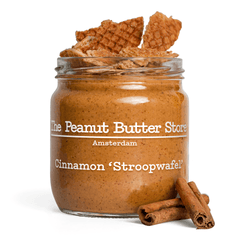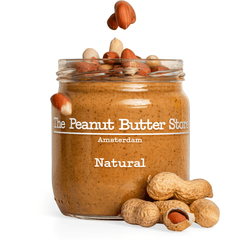Introducing Peanut Butter to Your Baby
Peanut allergies are now among the most common food allergies, especially in children. Many primary schools even ban peanut butter from lunchboxes due to the growing number of cases. But did you know that introducing peanut butter early in life may actually help prevent allergies?
Start Young, Stay Strong
Between 4 and 6 months, babies become more open to new tastes. This is the ideal time to start with vegetables as first foods, helping your baby get used to less sweet flavors. It’s important to introduce one new taste at a time—waiting about a week before trying something new.
From around 6 months, you can begin introducing peanut butter. As babies start transitioning away from high-fat milk feedings, it’s important to replace those healthy fats in their diet—and peanut butter is a great source of both protein and good fats.
Make sure the peanut butter you give is as pure as possible—low in salt and sugar, and made with mostly peanuts. That’s why we’ve created our special baby peanut butter, made just for little ones.
Many babies don’t love peanut butter right away—often because of the sticky texture. But don’t worry: most babies need to taste a new food 8 to 10 times before they really accept it. So keep trying!
How to Introduce Peanut Butter to Your Baby
-
Choose a peanut butter with 85–100% peanuts and minimal sugar and salt —like our baby peanut butter
-
Mix a small amount into your baby’s usual food to make it easier to eat
-
Go slow! Start with a teaspoon in the first week, then gradually work up to a tablespoon after a few weeks
-
Stop feeding it immediately if you notice any signs of an allergic reaction or intolerance (like eczema, constipation, or diarrhea), and consult a doctor
The Benefits of Early Peanut Butter Introduction
Peanut butter is a great way for babies to get healthy fats and proteins. But it also plays a bigger role: research shows that introducing potential allergens (like peanuts, eggs, gluten, and dairy) early in life can help lower the risk of developing food allergies later on.
As true Peanut Butter Bosses, we make peanut butter with no additives—our baby blend is made from 100% peanuts, with no added sugars, salt, preservatives, or thickeners. Just pure, natural goodness!
Already got a little peanut butter lover at home? Then our adorable “Peanut Boss” baby onesie is a must! Or grab our Baby Box—featuring our baby peanut butter and a cute romper :)
Sources
- Eijsden, M. & van Roost, M.: Voeding Magazine, stap voor stap een kind gezond leren eten. (2018). Sourced from https://www.vakbladvroeg.nl/wp-content/uploads/2018/08/Stap-voor-stap-een-kind-gezond-leren-eten.pdf
- Noordzij, F., Velsink, M., & Vondermans, C., Dossier: Voeding. (2019). Sourced from https://link.springer.com/article/10.1007/s41189-019-0058-4
- HiraSing, R.A., Kalidien, S., de Kroon, M.L.A., Kuijpers, T. & Sprikkelmans, A.B., JGZ-richtlijn Voedselovergevoeligheid. (2014). Sourced from https://link.springer.com/article/10.1007/s12452-014-0012-4
- Stichting Zuyderland Medisch Centrum: pindakaas en kippenei toevoegen aan babyvoeding. (2018). Sourced from https://www.zuyderland.nl/wp-content/uploads/2018/08/2018-08-10-Pindakaas-en-ei-toevoegen-aan-babyvoeding.pdf



